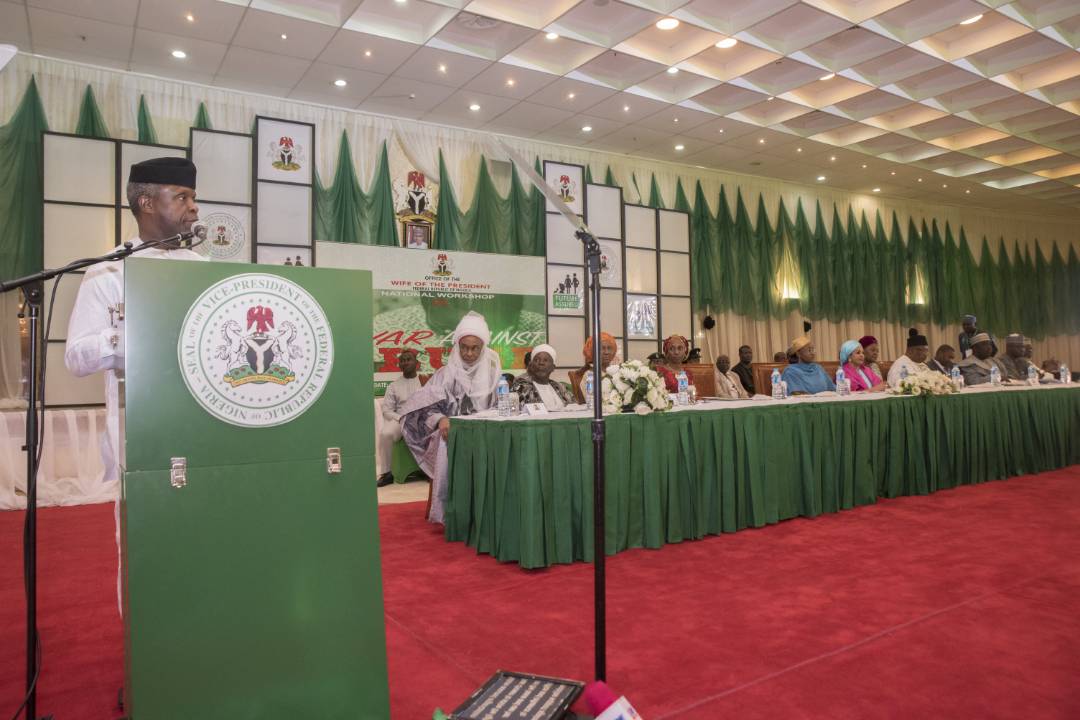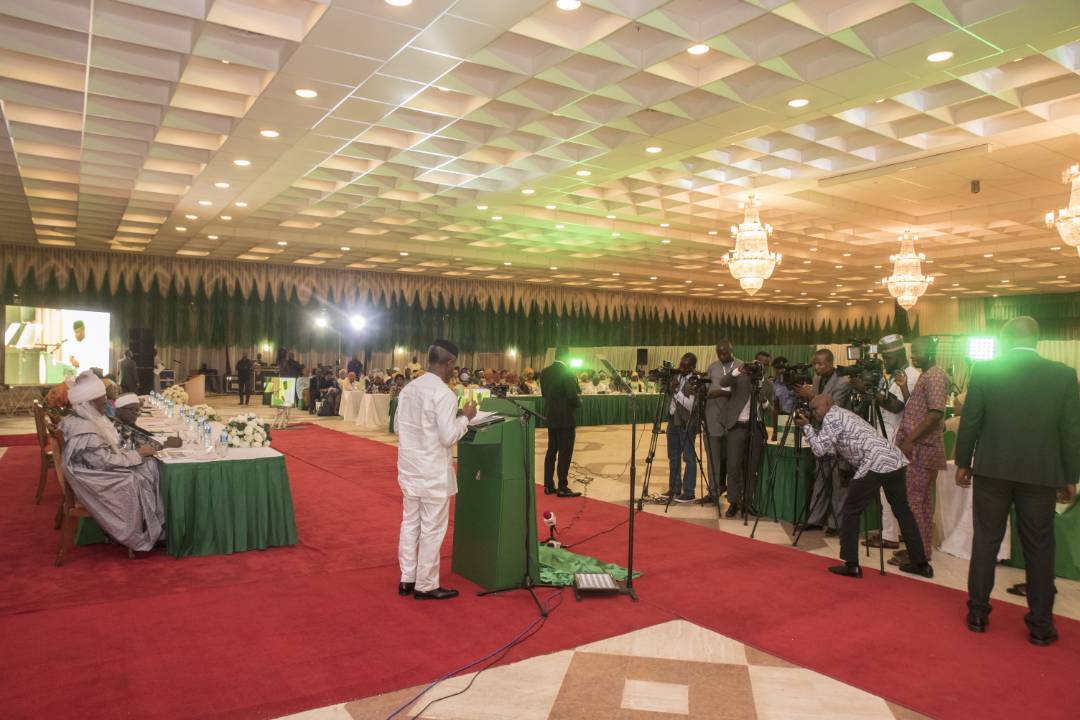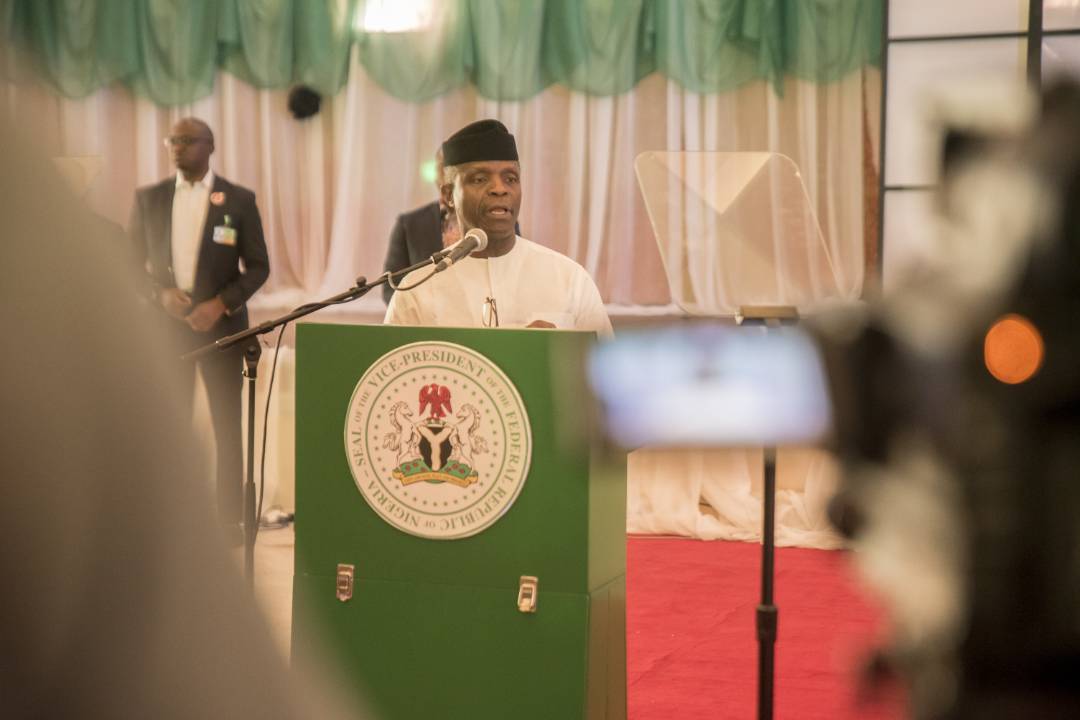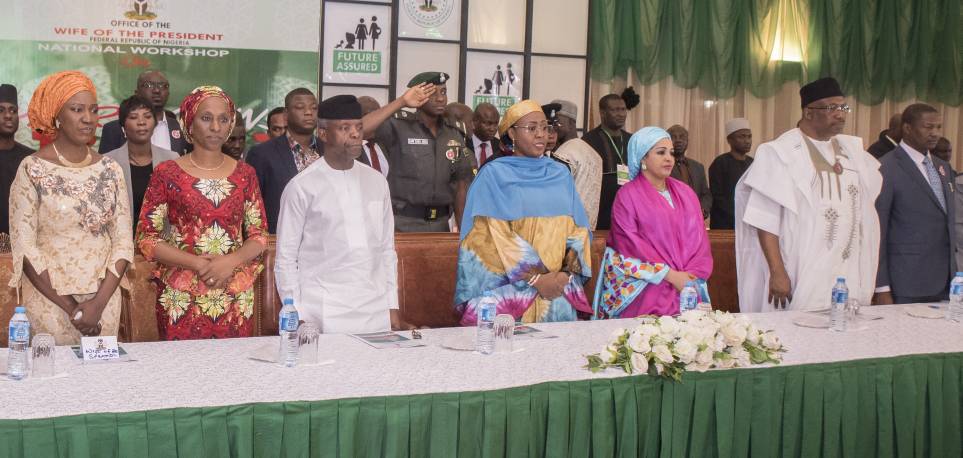National Workshop On War Against Abuse On Women And Children In Nigeria
MEN AND BOYS SHOULD PLAY A MORE ACTIVE ROLE AGAINST GENDER- BASED VIOLENCE
KEYNOTE ADDRESS BY HIS EXCELLENCY PROFESSOR YEMI OSINBAJO, VICE PRESIDENT OF THE FEDERAL REPUBLIC OF NIGERIA, AT THE NATIONAL WORKSHOP ON WAR AGAINST ABUSE ON WOMEN AND CHILDREN IN NIGERIA, DELIVERED AT THE STATE HOUSE BANQUET HALL ON SATURDAY, 16 DECEMBER 2017
Protocol.
It is an honour to have the opportunity of delivering a Keynote Address at this very important event on an issue of great significance to us as a society – the issue of abuse of women and girls.
It is especially gratifying that her Excellency the Wife of the President and her organization, the Future Assured Organisation have chosen to shine the light on the issue and use her office and influence to mobilise support against this scourge.
This attention is important, and must never be allowed to wane. By keeping the limelight on the scenarios of abuse we put ourselves in a stronger position to fully appreciate and successfully tackle this shame. It is heart-warming to note that around this time every year, the world devotes sixteen days, from November 25, the International Day for the Elimination of Violence Against Women, to December 10, Human Rights Day, to advocacy and activism against Gender-Based Violence.
A few weeks ago, news broke of the death of 26 girls, on a boat floating in the waters off the coast of Italy. By some indications, some of them could be Nigerians. It was for most of us heart-breaking news, made even worse by the fact that these were young girls who could be a small sample of the actual number of our girls and women in Nigeria and perhaps all around Africa, who are perishing in these tragic circumstances.
The President directed a comprehensive investigation to, among other things, verify the nationalities of the victims, and the actual circumstances leading to the tragedy. Relevant Government agencies are also working with their international counterparts towards forestalling a recurrence of the incident.
The question that arose from that incident is how many more young women are subjected to these kinds of conditions? What are the circumstances that led to the death of these women?
Even if it turns out that only a few of the victims were Nigerians, one life lost is far too many, and yet we are losing hundreds. Those who are lucky to escape death find themselves confronted with a fate just as terrible – life in some cases as sex slaves and in the most inhumane conditions imaginable.
Here at home the dangers are just as real, an endless array of instances and scenarios that are nothing short of abusive; the constant flow of underage boys and girls into urban areas, to work as domestic help in usually middle and high class neighborhoods; the baby factories, I’m sure we’ve heard of examples of situations where girls are taken into some form of confinement for the purpose of producing babies; the conscription of children as beggars; the stigmatisation of certain classes of women as witches and wizards; the young girls indoctrinated to serve as suicide bombers; the women subjected to rape and other forms of sexual abuse – female genital mutilation, oppressive widowhood practices, etc. The list is disturbingly endless.
The starting point for the conversation around abuse is that it can indeed be prevented. This is an important issue that we can actually do something about it and we don’t have to wait till it happens before we take action. While we must ensure that abusers are identified and punished, the greater part of our efforts should go into ensuring that we do all in our power to prevent the abuse from happening in the first place, by proactively identifying risk factors and intervening decisively to deal with them before abuse happens.
And when we speak of prevention, victims should not be made to be on the defensive. All too often women and girls are advised and counselled on how to prevent or avoid rape, what to wear or what not to wear, where to go or not to go, with little or no emphasis placed on engaging and counselling men and boys about how to treat women and girls.
The case for treating women and girls with equality and dignity is a self-evident one. Women account for a significant part of our nation’s talent pool; as a matter of ratio, we are told that it is 50:50, 50% men, 50% women, as do young people below the age of 18. Nigeria’s progress and prosperity, therefore, is greatly affected by our ability to safeguard women and children.
We must never become accustomed to condoning the abuse of our most vulnerable people or to turn a blind eye to exploitation. A number of institutions in our society – social, cultural, religious – are sometimes complicit in the perpetuation of these forms of abuse. Government’s share of the burden of responsibility is clear, especially considering that the government has a monopoly of the law enforcement role regarding gender-based violence.
Already, the Rule of Law Advisory Team in Office of the Vice President is collaborating with relevant agencies and non-governmental organisations working in the area of Sexual and Gender-Based Violence (SGBV) in the enhancement of reach and access of their protective services to victims. The Team is working, in collaboration with the Federal Ministry of Women Affairs, to set up a National Sexual and Gender-Based Violence Response Team that brings together all relevant line Ministries and agencies, including the Federal Ministries of Health, Justice, Education and the Nigeria Police, working closely with States and Local, Governments, as well as Community Based networks and Civil Society Organisations (CSOs) to address the various aspects of sexual and gender-based violence.
We have formed strategic partnerships with relevant stakeholders, local and international, including the British Council and Partners West Africa – Nigeria, all of whose commitments have proven valuable in supporting our efforts to succeed on the war against Gender-Based Violence in Nigeria.
We have also established a dedicated desk that deals primarily with providing technical support to States in addressing and coordinating sexual and gender-based violence response. That desk is already supporting the Administration of the Federal Capital Territory and is in discussion with stakeholders in a number of pilot States to identify and train service providers; establish strong protocols and operational guidelines for gender-based violence response; raise SGBV awareness; and supervise welfare services to ensure that beneficiaries are getting a high quality of service.
Law enforcement is no doubt critical to all of the efforts that we are making. The needed legal and policy frameworks are already in place in Nigeria, so we have no questions with the laws. The Constitution of the Federal Republic of Nigeria, the National Gender Policy, the Violence Against Persons Prohibition Act, and, at the international level, we have the International instruments promoting women’s human rights. What is needed is the judicious implementation of already existing laws. What is needed is enforcement. This requires the active collaboration of the law enforcement agencies and the judiciary, the judiciary also needs to be trained in gender violence concerns; sometimes there isn’t enough understanding of the harrowing conditions people go through especially young girls and young women who have been raped. It is important for our law enforcement and administration of our justice system to be specially trained and sensitized to the various difficulties in ascertaining whether a crime has been committed.
It is my hope that as deliberations continue over the course of today, all of the critical issues will be exhaustively considered. I look forward to some of the results of this, and in your deliberations, I want to see some emphasis on the role of men and boys in the war against Gender-Based Violence; the role of community and religious leaders as influencers of norms and practices; the role of citizens as effective mediators and the voice of victims in determining interventions; the need for alliances, collaborations, strengthened institutions, and for additional research that will provide strong evidence base for more informed decisions on Sexual and Gender-Based Violence at all levels.
It is also my hope that the Workshop will end with renewed commitments by all participants and stakeholders, to the fight against sexual and gender-based violence, and the protection of the rights and dignity of all the women and children of Nigeria. Once more let me commend her Excellency the Wife of the President and her team at the Future Assured, for her critical and selfless intervention in important social causes and issues.
I want to say that your approach is the right one, one of the reasons why God gives us an opportunity to serve is because he expects us to speak and act for the voiceless and the defenceless. You have done this so well.
It is now my special pleasure and privilege to declare this workshop open.
The starting point for the conversation around abuse is that it can indeed be prevented. This is an important issue that we can actually do something about it and we don't have to wait till it happens before we take action. While we must ensure that abusers are identified and punished, the greater part of our efforts should go into ensuring that we do all in our power to prevent the abuse from happening in the first place, by proactively identifying risk factors and intervening decisively to deal with them before abuse happens.





